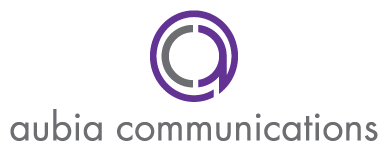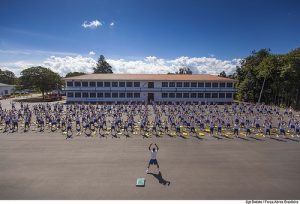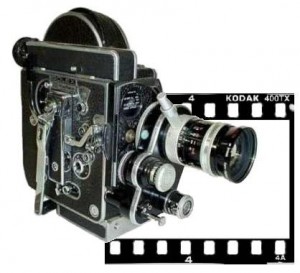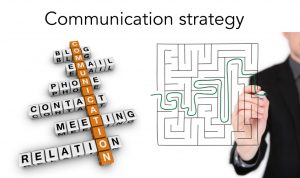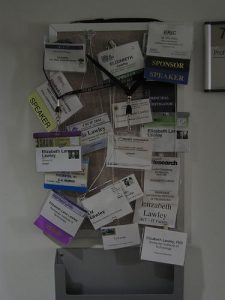
Professional development is important for many reasons, and as we discuss this career need throughout the month I had a chance to talk with Vincent Rhodes, co-chair of the Professional Development Committee for the Hampton Roads Public Relations Society of America. He provided some great information for public relations professionals seeking to enhance their careers with further education and training.
1. Why is professional development in any career field, but especially public relations, important?
I’m a firm believer in lifelong education. You can never know enough about your craft or your field. Your organization and your audiences are counting on you to be an expert in your field. You owe it to them and to yourself to be the best public relations professional that you can be. I’m reminded of a cliché (forgive me!): “If the only tool you have is a hammer, every problem looks like a nail.” Professional development ensures you have other tools in your belt and gives you more options for responding to challenges.
2. What are your top three recommendations on how to pursue professional development in public relations?
1) Find ways to go both broad and deep. Find opportunities that will stretch your knowledge and skill set. Our field is constantly changing — particularly when it comes to technology and social media. Be sure you’re learning new things and keeping up with advancements in the field, but also take opportunities to deepen your knowledge of a specific subject.
2) Find consistent, reputable and worthwhile opportunities. Let’s face it, some conferences, workshops and professional development sessions are better than others. Try different options but make sure you are finding value and quality. If you aren’t, look elsewhere.
3) If you’re at a conference and the session you’ve selected isn’t turning out to be what you hoped, don’t be afraid to go to a different one. Sometimes the session title and description aren’t really what the speaker ends up talking about. Or, perhaps the session winds up being more basic (or more advanced) than you thought it would. If it’s not a fit, find a way to slip out and make another choice. This is your investment. Get the most for your money. It happens to everyone. As long as you are being as respectful and as inconspicuous as possible, people understand the need to make a change if the session doesn’t work for you.
3. How can a PR practitioner pursue professional development opportunities when there is no money in the budget for training?
Don’t just think of courses or conferences. Professional development can be self-guided. Read a book on the topic of interest. Subscribe to industry publications. Explore academic PR journals. Then, find some colleagues to discuss the readings with and look for online opportunities. Sure, these could be online, self-paced courses, but you also can learn from online blog posts (like this one!), find examples of the topic you’re learning about, or even find an online discussion forum of fellow professionals engaged around the topic you’re studying.
More and more professional development companies and industry organizations are offering webinars. These can be a great value (read that: inexpensive). They are fairly short (an hour or so), are available online and by dialing into a conference line, and don’t require that you travel or miss much work time. These quick hits can be just what you need to learn the basics about some topic or get some new ideas. And, if your company won’t cover it, perhaps you can deduct the cost on your taxes as a professional expense.
4. How can one convince the boss professional development is valuable to not only the individual but also the position and office?
Use the same tactic you use for your typical target audiences: WIIFM. Answer What’s In It For Me (Well, in this case, what’s in it for him or her). Be prepared to talk about the practical application of the particular professional development opportunity you’ve chosen in the context of your organization. Does it tie to a specific strategic objective? Does it address a problem your organization is currently facing or about to face? Does it help you measure results and/or maximize Return on Investment? Just be sure you’ve picked the right opportunity and that you’ll actually be able to deliver on that promise.
5. What are your top three picks for professional development conferences to attend in the public relations industry?
1) Think local. Join your local chapter of the Public Relations Society of America. It’s a great investment in your career. Our local Hampton Roads chapter offers luncheon sessions most months that bring in speakers on timely topics. You can attend even if you aren’t a member (it just costs a little more). These lunch sessions are not only a great way to learn, but also a great way to network with your peers. Our chapter also hosts a professional development conference once a year (generally in October). This day-long event is provided at an excellent price point and doesn’t require out-of-town-travel. Be sure to check us out!
2) Though not a specific pick, but an important piece of advice nonetheless, consider professional organizations in your area of industry. When I worked in public education I found great benefit in the conferences hosted by the National School Public Relations Association, the Council of the Great City Schools, and the National School Boards Association. Now that I am in academic medicine, I find the same is true of our industry organization, the Association of American Medical Colleges. See what your industry organizations have to offer.
3) I’ve also liked the conferences and workshops held by Ragan Communications. They cover a wide variety of topics and host events throughout the country so you might find something close to your location (or, in a place you’ve always wanted to visit).
6. Do you have any other suggestions or comments about professional development in the public relations field?
Just this: Do it! You can’t afford not to invest in yourself and your future. It’s a critical component for your career and success — not a luxury.
Vincent Rhodes currently serves as Director of Marketing and Communications for Eastern Virginia Medical School. Previously, he served as Communications Manager and Clerk of the School Board for Norfolk Public Schools. Rhodes also taught high school English, journalism and TV production courses. Prior to becoming an educator, Rhodes served as managing editor of the national scuba diving magazine Sport Diver and as a scuba instructor. He currently serves on the Board of Directors for the Hampton Roads chapter of the Public Relations Society of America and is a resident of Norfolk, Va. Find him online at vincent.MaskreyRhodes.com.
